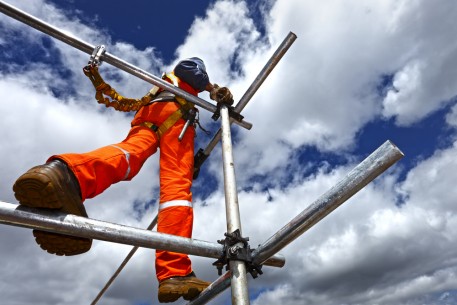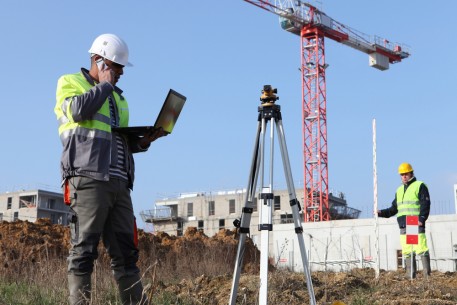Plenty of businesses run into the same problems of running out of space to operate. Storage.com is here to help provide solutions for growing businesses, whether through unique tips or additional space.
The services you provide as a contractor are a big part of what makes everyday life convenient. Where would we be without the architecture, roofing, basic electrical, plumbing, and other features that contractors and subcontractors provide? Carrying out these jobs requires dedication, teamwork, and a high priority of safety. Here are 8 things only a contractor would understand.
1. TEAMWORK! TEAMWORK! TEAMWORK!

The first thing contractors know is that a good construction project does not fall on a single person’s shoulders. A contractor may be in charge of seeing the project through, but high-quality production also depends on the skill and expertise of your team, not to mention any subcontractors you hire on to help complete the job. Only by working together and utilizing each other’s strengths and areas of expertise will the project come through on schedule and make the client happy.
2. FINDING GOOD ASSOCIATES.


Quality construction is not only a matter of good teamwork, but it’s also about finding good team members and associates. Of course, you can take as much care as you want in recruiting your own staff, but you should also take care in picking out other teams you’ll be working with. General contractors need to have reputable and dependable subcontractors to handle specific necessities such as electrical, plumbing, carpeting, and painting, just to name a few.
According to Mark Graham, Vice President of Technical Services for National Roofing Contractors Association, subcontractors also want to be associated with general contractors that have a good reputation and solid work history.
“If you’ve not worked with a particular general contractor before, you should look for a good reputation or someone you’ve heard of before,” Graham says. “That’s important for a good professional experience–getting paid, of course, is very important–as well as benefiting your own organization.”
3. COMMUNICATION IS KEY!


Because construction is a team effort, a contractor’s communication skills need to be exceptionally strong.
“Communication is essential in this industry,” explains Brian Turmail, Senior Executive Director of Public Affairs for Associated General Contractors of America. “[General contractors] are responsible for overseeing every aspect of a project. Their ability to guide assignments, timelines, maintain schedules, and conduct last-minute changes without error is very important.”
If a change in plan occurs, the word needs to be spread to everyone involved in the project. General contractors need to stay in touch with their subcontractors, and vice versa. Any misinformation to any one of these teams could result in a confused mess that will stall production and displease the client.
4. UNDERSTANDING YOUR CLIENT.


Speaking of the client, contractors need to regularly stay in touch with them. Graham says it is important to make sure all parties are on the same page and headed in the same direction, especially when unexpected changes in the plan happen. Sometimes a client’s vision exceeds practicality and a good contractor needs to be able to successfully negotiate changes while proposing solutions that will maintain a good relationship with the client and still produce good results.
“The sooner communication can be reached, the easier it is to resolve those types of situations,” says Graham.
5. ENSURING SAFETY PROTOCOL.


According to Joeris General Contractors, Ltd., safety is a major priority for contractors, and it is important for contractors to be aware of and follow the OSHA rules on safety and health regulation.
“Construction sites are a moving environment, usually with high structures that sometimes are not complete. The environment is loud and is sometimes exposed to weather elements,” explains Turmail.
Following safety protocol reduces not only the number of injuries on the job, but also the number of phone calls to parents/spouses that someone is in the hospital, and payments that need to be sent into workers’ comp. Injuries and accidents also create delays and slow down construction, so no one truly benefits if caution is not taken on the job.
6. WORKERS’ COMP.


Accidents can sometimes happen, that is why they are called accidents. When they do, it is fundamental that employees are covered under workers’ compensation. Workers need assurance that if they are injured on the job, they will receive payment for medical treatment, wage replacement, and rehab if necessary.
7. STAYING UP-TO-DATE ON TECHNOLOGY.


Technology is always growing, and the tools and equipment used on construction projects are no exception. As technology advances, clients will come to expect higher-quality results and efficient production schedules. For example, Joeris stresses the importance of employees being able to use of robotic layout tools and contractors knowing a wide variety of construction processes and techniques.
8. BUILDING AND MAINTAINING A GOOD REPUTATION.


Of course, even with a qualified team, technology, and work ethics—a contractor is unlikely to see many new clients unless people are saying good things about their services.
“Building a good reputation is vital as a contractor,” says Turmail. “What distinguishes one contractor from another? Their reputation. When you are doing business with a contractor, there has to be a lot of skill, experience, and confidence. Every construction project is a matter of trust.”
Clients will be more inclined to recruit your services and trust you to provide quality services if they read and hear good things about your past projects. This helps them choose between one contractor and another.
Have you ever hired a contractor? What was your experience? Let us know in the comments!





